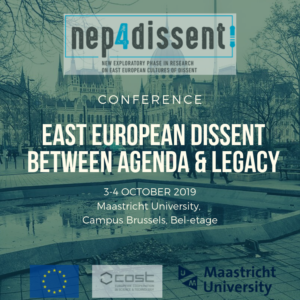East European Dissent between Agenda & Legacy

October 03, 2019 - October 04, 2019

Fotó/Forrás: Szabad Egyetem / Facebook
This conference shall analyze the making of the legacy of East European dissent on the local, national and European levels. Interested primarily in the cultural and political aspects of this process, this conference aims to explore the following questions in particular: how have cultural products related to dissent and repression been employed to depict social relations and legitimize political regimes before and after 1989? How have political-ideological, ethnic or gender-related factors impacted what has been included in and excluded from the legacy of dissent? How have the biographies, agendas and roles of ‘post-dissidents’ shaped and been shaped by processes of remembrance and canonization in the decades since 1989? Conversely, how has ‘1989’ and the process of transition been viewed from the perspective of individuals and groups who did not associate any major expectations or fears with them? Last but not least, what is the relevance of communist-era dissent for Europe today?
The Organizing Committee consists of Muriel Blaive (Institute for the Study of Totalitarian Regimes, Prague), James Kapalo (University College Cork), Ferenc Laczó (Maastricht University) and Tamás Scheibner (ELTE University of Budapest).
Maastricht University, Campus Brussels, Bel-etage
Program
Oct 3
14 00 Introduction to the conference by Muriel Blaive and Ferenc Laczó
14 10 Keynote Michal Kopeček, Dissident Politics of Rights and its Legacy after 1989, chair: Muriel Blaive
15 30 Panel 1: The Politics of Dissent
Chair: James Kapalo, Comments by Tamás Scheibner
Anna Förster, The Parallel Polis. Towards the History of a Contested Concept
Ksenija Marković Božović, Belgrade June Sixty-Eight: Prime and Reprises
17 00 Panel 2: Casting and Recasting Dissidents
Chair: Ferenc Laczó, Comments by Barbara Falk
Muriel Blaive, From Dissidence to Heroism: Construction of a Societal Ideal of Post-Communist Identity in the Czech Republic
Anca Sincan, In-house historians: religious communities re-writing their communist past
Ana Miškovska Kajevska & Zsófia Lóránd, Configurations of feminist dissent in the Yugoslav region pre- and post-transition
Oct 4
9 00 Panel 3: Post-Dissident Trajectories and Legacies
Chair: Tamás Scheibner, Comments by Ferenc Laczó
Valentin Behr, From Solidarity hero Lech Walesa to secret informer “Bolek”: Struggles around the legacy of dissent in post-communist Poland
Agáta Šústová Drelová, Catholic Dissent in Slovakia after 1989
Ionut Biliuta, Fascist Martyrs as Dissidents? Fascist Hagiography and Anti-Communist Resistance in Contemporary Romania
Luka Lisjak Gabrijelcic, Whose revolution was it anyway? Convergence and divergence in the post-dissident narratives on the legacy of the “Slovenian Spring”
11 00 Keynote Barbara Falk, 1989-2019: Legacies of 1989 for Dissent Today, chair: Tamás Scheibner
14 00
Panel 4: In/Visibility in the Remembrance of Dissent
Chair: Muriel Blaive, Comments by Michal Kopeček
Aigi Rahi-Tamm, “We are not dissidents.” How to catch the voices of silent society? The case of Estonian SSR
Odeta Žukauskienė, Invisibility of Dissenting Networks: A Shadowed Remembrance of Counterculture
Jan Matohona, Dispositives of Silence, Silencing and Foreclosure: Gender, Affective Interpellations, Wounding Attachments and Injurious Identities in the Politics of Exile and Samizdat Literature in pre-1989 Czechoslovakia
16 00 Final roundtable on the Legacy of Dissent
With Emilia Barna, Alexander Bikbov, and Mariya Ivancheva
Moderator: James Kapalo
Details
- Start
- October 03, 2019
- End
- October 04, 2019
Organizer
Muriel Blaive, James Kapalo, Ferenc Laczó, and Tamás Scheibner
Address
- Maastricht University, Campus Brussels, Bel-etage
-
1150 Brussels ,
Belgium
Avenue de Tervueren 153
